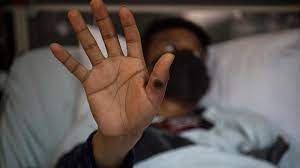Monkeypox infections continue to rise globally, with more than 35,000 cases across 92 countries and territories, and 12 deaths, the head of the World Health Organisation (WHO) reported on Wednesday.
“Almost 7,500 cases were reported last week, a 20 per cent increase over the previous week, which was also 20 per cent more than the week before,” said WHO Director General Tedros Adhanom Ghebreyesus, speaking during his regular press briefing from Geneva.
The majority of cases are being reported from Europe and the Americas, and mostly among men who have sex with men.
“The primary focus for all countries must be to ensure they are ready for monkeypox, and to stop transmission using effective public health tools, including enhanced disease surveillance, careful contact tracing, tailored risk communication and community engagement, and risk reduction measures,” said Tedros.
Currently, global supplies of Monkeypox vaccines are limited, as is data about their effectiveness. WHO is in contact with manufacturers, and with countries and organisations willing to share vaccine doses.
“We remain concerned that the inequitable access to vaccines we saw during the COVID-19 pandemic will be repeated, and that the poorest will continue to be left behind,” said Tedros.
COVID-19 deaths have also increased over the last four weeks, rising by 35 percent, with 15,000 lives lost in the past week alone.
“Fifteen thousand deaths a week is completely unacceptable, when we have all the tools to prevent infections and save lives,” Tedros remarked.
Although everyone might be tired of COVID-19, “the virus is not tired of us,” he said.
Omicron remains the dominant variant, with the BA.5 sub-variant accounting for more than 90 per cent of genome sequences shared in the last month.
Tedros reported that it is becoming harder to understand how the virus might be changing.
The number of sequences shared per week has fallen by 90 per cent since the beginning of the year, and the number of countries sharing sequences has also dropped by 75 percent.
He warned that with colder weather approaching in the northern hemisphere, and people spending more time indoors, the risk for more intense transmissions will only increase.
“But none of us is helpless – please get vaccinated if you are not, and if you need a booster, get one,” he advised, in addition to measures such as wearing a mask and avoiding crowds, especially indoors.
“There is a lot of talk about learning to live with this virus. But we cannot live with 15,000 deaths a week,” he said.
SOURCE: UN NEWS CENTRE/PACNEWS













